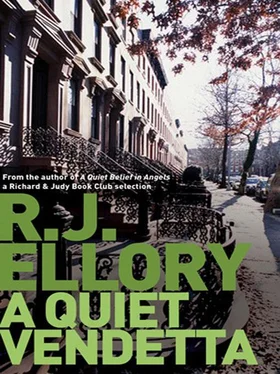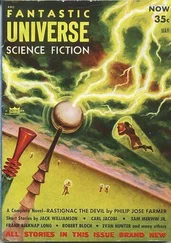Hartmann shook his head. ‘I don’t believe we’re gonna find that out until tomorrow.’
There was silence for a moment, and then Woodroffe once again spoke of the son.
‘What the hell is this with you and the son?’ Schaeffer asked.
‘It’s the thing about family,’ Woodroffe said. ‘Perez was always an outsider. True, he might have worked and lived with these people for the better part of his entire life, but the fact of the matter was that he was never really one of them. His wife and daughter were murdered and the families did nothing. They couldn’t do anything, because of the nature of their relationship with Perez’s wife, but primarily because Perez wasn’t Italian. He was Cuban, an outsider, and really nothing more than a hired hand. Had he been Italian they would have taken their revenge. Of that I am sure.’
‘But they didn’t,’ Hartmann interjected. ‘And so perhaps he has taken his own.’
Neither Schaeffer nor Woodroffe said a word. The silence in the room was tangible, and when Hartmann spoke once more it was as if he was the only person present.
‘Maybe all of this was about Feraud and Ducane. Maybe the girl is dead. That’s the worst scenario, right? She’s dead someplace, her heart cut out, or her body in pieces and thrown into the swamps for the ’gators. Maybe the son had nothing to do with it and never did. Maybe he was ignorant all these years to the kind of man his father was. Truth is, the only person who knows everything is Ernesto Perez, and come tomorrow – if he tells us everything – then we will know as well.’
‘You think she’s dead?’ Woodroffe asked.
Schaeffer nodded. ‘Yes, I reckon so. Statistically, a missing persons report is filed, and within the next twenty-four hours the leads stay live. After that they go cold, people make tracks across everything. Footprints, fingerprints, hair and fibers and Christ only knows what else get lost in the passage of humanity. Another three days and the likelihood is the person is dead. Give it ten and the odds on them being still alive are down to about four percent. That’s statistics based on hundreds of thousands of missing persons reports, abductions, kidnappings, every kind of case where someone takes a walk and never comes home. The ones that are found, the ones that make it back alive… Well, they are home within forty-eight hours. That’s just the cold, hard reality of the matter.’
‘So why kill her and go through all of this?’ Woodroffe asked, knowing even as he asked the question that the answer was obvious, and voicing it for no other reason than grasping at straws, asking anything that might throw some fragile shadow of hope across the thing.
‘So we would sit here patiently and listen to his life,’ Hartmann said.
‘And that, simply enough, was the way he could make us hear the truth about Feraud and Ducane,’ Schaeffer said.
‘Maybe,’ Hartmann replied.
‘Right,’ said Woodroffe. ‘It’s all a maybe.’
Hartmann looked up at both of them. ‘Until tomorrow,’ he said, and rose from his chair. He walked along the hallway to the stairwell and made his way down to the foyer.
He believed he’d never been so exhausted in his life.
He was there on the street in front of the hotel when the FBI transporters came. There were two of them, an older man, tall and heavy-set, almost too old to be in active service, and a much younger one, dark-haired, and had he been but a few years older they could have been stand-ins for himself and Perez. Agents such as these were specially assigned to tasks such as this – the passage of Ernesto Perez to Quantico, right into the heart of the Federal Bureau of Investigation Headquarters, and there – while he awaited whatever judicial procedure the Bureau had arranged for him – there would be a hundred profilers with a hundred different tests, all of them eager to ascertain the specific common denominator that linked all such people together. There was no one thing: Hartmann knew that from studying thousands of case files on all manner of killings. These people were human beings just like the rest of us, and Hartmann believed all people possessed the capacity and will to murder; it was merely a matter of environment, conditioning, situational dynamics as they were so often referred to, that precipitated that actual moment, the split-second heartbeat when the mind moved the hand and the hand pulled the trigger or buried the knife or tightened the cord around someone’s unsuspecting throat. It was not complicated; it could not be filed or classified or cataloged or cross-indexed; it was what it was, and what it was would always and forever come down to people. Guns were never the cause of death; thoughts and emotions and reactions were the force majeure . People killed people, and that was all there was to it.
So Ray Hartmann sat smoking his cigarette while the transporters made idle talk with the other agents present, and no-one seemed to possess the same degree of tenacity or drive about this thing. Perhaps they all subconsciously knew it was coming to an end. Perhaps they all believed that Catherine Ducane was dead, and thus there was nothing else worth fighting for.
Outside the hotel stood an armored four-by-four Humvee. Dark gray, mirrored windows, bulletproof tires, skirting between the wheels that was designed to prevent anything being rolled beneath the vehicle. It was in this vehicle that Perez would make his final journey from Louisiana. Once he climbed inside that car he would never come back. Of that Hartmann was certain. And himself? Would he ever come back? He believed not, for this had not only been a trial by fire, it had also served as some means of exorcism and catharsis. Perhaps Louisiana would always and forever hold his past, both his childhood, and this particular rite of passage.
He rose and crossed the foyer. He shared a few words with the transporters – the elder one, Warren McCormack, the younger one, David Van Buren. They were cold and businesslike; they were here to do something specific, something functional and precise. They had done this sort of thing a thousand times before, ferrying the worst the world could offer to their final destination, and they were hardened and matter-of-fact and eager to be on their way.
Hartmann left the Royal Sonesta and walked the long route back to the Marriott. He felt as if he were breathing New Orleans air for the very last time. Tomorrow he would be gone. Tomorrow he would fly back to New York and call Carol. He considered once more what she had said when he’d had Verlaine call her. That she’d expressed doubts. Actions speak louder than words , she had said, and he felt sure he could demonstrate the necessary actions if only he was given another chance. But how many chances had she given him already? And how many times had he let her down? He would speak with Jess again, he knew that, and it was something he could almost physically anticipate. He wanted that meeting so much, a meeting where they could talk about the possibility of making their lives together work. He felt the conflict then: the need to know about Catherine Ducane versus the desire to know nothing more. Perhaps that was the point he believed he could let go of it all. It was so much a part of him, as intrinsically his own as his fingerprints, the sound of his voice, the way his face looked when he stared at himself in the mirror. Perhaps he had let whatever held him within this go – finally, without question. Perhaps. Time would tell.
In his room he watched TV. Cartoons, ten minutes of some awful made-for-TV movie, a brief flash of news that reminded him that the world had gone on about its business without him. He’d been here eight days, all of thirteen or fourteen hundred hours, and whereas a week had just effortlessly slipped through his fingers in New York, this week had seemed like a hundred years all crammed together with no breathing space at all.
Читать дальше







![Quiet Billie - Don't mistake the enemy [СИ]](/books/421973/quiet-billie-don-t-mistake-the-enemy-si-thumb.webp)




